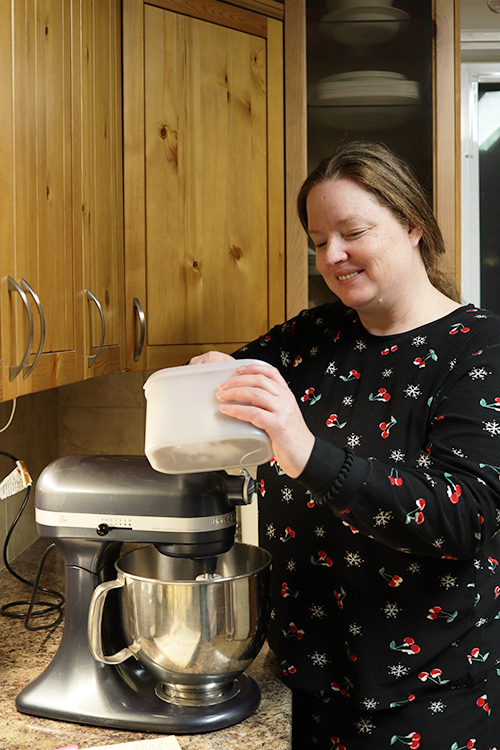Not all hobbies are music based. For Tj Colyer, baking gives her a sense of flow, that feeling when you lose track of time, in a good way.
“A jack of all trades, master of none.” In our modern world this phrase is often a slight against people who dabble in various activities not related to their occupations.
Originally this phrase was meant as a compliment. Perhaps we should go back to this interpretation, for is variety not, as poet William Cowper once wrote, the spice of life?
So, what better way to try something new than by starting a hobby?
In an article from Verrywell Mind by Elizabeth Scott PhD, titled The Importance of Hobbies for Stress Relief published Sept. 14, 2020, it states, “Hobbies are often thought of as activities for people who lead quiet, relaxed lives, but people with full, busy, even stressful lives may need hobbies more than the average person. Hobbies bring many benefits that usually make them more than worth the time they require.”
For Andrew Ichikawa a local music therapist and musician, a hobby focused on music is a pretty great place to start.
“I think there’s a lot of things that just being involved in music can do for you as a hobby: developing a skill; obviously, you’re working out; you’re going through a practice routine; you’re reaching milestones,” says Ichikawa.
In an article written by Andrew Bulloch and others published by the University of Calgary Oct. 2, 2018, titled Prescribe Music for Better Mental Health, “There are few things that stimulate the brain the way music does. Research shows that listening to music can reduce anxiety, blood pressure, and pain, while improving sleep quality, mental health and memory.”
Ichikawa also points out the connection we can have with others when we play music.
“If you’re playing in a band, for instance, it’s totally clear or if you’re performing at all, then you have that social aspect. But even if you’re just, you know, learning an instrument on your own, playing along to records or whatever, if you’re strumming along with an album, you’re actually trying to be in tune with that music, so there’s actually a connecting in that sense,” says Ichikawa.
An article by Jamie L. Kurtz Ph.D. titled Six Reasons to Get a Hobby published Sept. 15, 2015, in Psychology Today states, “Hobbies promote flow… If you’ve ever lost yourself in a sport, art project, or other challenging, absorbing activity, you’ve experienced flow. Time flies, self-consciousness disappears, and you are fully immersed in the activity at hand. Hobbies, especially those that stretch our skills, foster this desirable and increasingly elusive state.”
Victoria Nestorowicz, a local musician and music teacher, finds that state with singing.
“Being able to sing, whether it be in front of people or just by myself, is kind of a release that I could never really get any other way,” says Nestorowicz.

Ichikawa also relates to this state.
“I can remember when I was practising, and when I was really, you know, studying and stuff, I’d get to these moments where you’d just be so euphoric at being able to play something new. You almost have to stop and settle down and say, OK, let’s keep working on this because it’s such an exciting thing,” says Ichikawa.
So how long do we need to spend on these activities to experience benefits?
According to the Very Well Mind article Scott writes, “One study found that those who engage in physical leisure activities for at least 20 minutes once a week are less susceptible to fatigue.”
Nestorowicz sees a benefit in more regular activity, especially if you are working on learning a new skill.
“When I was playing and really wanting to get better, I found that if I took 15 minutes in the morning, 15 minutes in the afternoon and then 15 to 20 minutes in the evening, I would notice that I would get better which felt good,” says Nestorowicz.
She also points out the importance of taking breaks.
“If I’m just kind of stuck somewhere, if I can put it down and then come back to it later that day, or later that week even. I find it flows a little better, you know?” says Nestorowicz.
Ichikawa says music can have benefits through your entire life.
“There have been studies that kids who study music are doing better in math and languages and things like that. So, there’s all those general benefits,” says Ichikawa.
He also thinks having a hobby throughout life is an excellent way to stay mentally sharp as we grow older.
“In the case of music, you know, well, I guess any hobby, we used to think that as we grew older, we couldn’t learn new things,” Ichikawa says. “But I think now with the studies in neuroplasticity, we know that you can learn an instrument at an older age.
Maybe it takes a little bit longer than when you’re younger, but that new learning you know, can keep you mentally sharp,”
Music has many benefits but any creative or physical hobby can create that sense of flow, accomplishment or wellbeing.
Drawing, knitting, painting, baking, crochet, photography, a sport, dance, printmaking, sewing, cooking or any endeavour that requires practice to acquire the appropriate skills are beneficial.
So, if you haven’t found a passion yet, try something you’ve always wanted to.
Remember it will take time to get good at it, but if you truly enjoy it, the practice will not seem like work.
The Head to Health website from the Australian government states, “Your interests may be creative, athletic, academic, or something distinctly personal. You may choose a hobby that you can do alone or as part of a group. Whatever your interests are, there is sure to be a hobby out there for you. What matters is that it is something you find meaningful and enjoyable.”
If you already have a passion don’t neglect it. Take time regularly to get better at whatever it is and the benefits will be felt all through your life.




